Malcolm X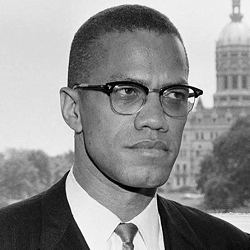
Malcolm X (born Malcolm Little, later Malik el-Shabazz) was a prominent African-American Muslim minister and human rights activist during the civil rights movement. Until 1964, he was the Nation of Islam's spokesman, and he was a vocal advocate for Black empowerment and the promotion of Islam within the Black community. In 1965, his posthumous autobiography, on which he collaborated with Alex Haley, was published. Early Life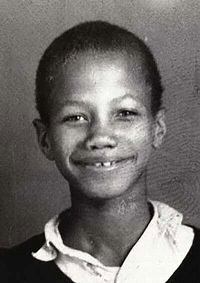
Malcolm X was born on May 19, 1925, in Omaha, Nebraska, the fourth of seven children to Grenada-born Louise Helen Little and Georgia-born Earl Little. Earl was an outspoken Baptist lay speaker, and he and Louise admired Pan-African activist Marcus Garvey. Earl was a local leader of the Universal Negro Improvement Association (UNIA), and Louise served as secretary and "branch reporter," sending news of local UNIA activities to Negro World; they instilled self-reliance and black pride in their children. Malcolm X later claimed that white violence killed four of his father's brothers. Earl's UNIA activities were said to be "spreading trouble" because of Ku Klux Klan threats, and the family relocated to Milwaukee in 1926 and then to Lansing, Michigan, shortly afterward. The Black Legion, a white racist group Earl, accused of burning down their family home in 1929, harassed the family frequently there. Malcolm's father died in a streetcar accident when he was six years old, though his mother, Louise, believed the Black Legion had murdered Earl. Rumors that white racists were responsible for his father's death spread widely, which disturbed Malcolm X as a child. As an adult, he expressed conflicting opinions on the subject. Malcolm attended West Junior High School in Lansing and Mason High School in Mason, Michigan, but dropped out before graduating in 1941. He excelled in junior high school but dropped out of high school after a white teacher told him that his aspiration of becoming a lawyer was "no realistic goal for a nigger." Later, Malcolm X recalled feeling that the white world, regardless of talent, offered no place for a career-oriented Black man. Malcolm worked a variety of jobs while living in Roxbury, a predominantly African-American neighborhood of Boston, with his half-sister Ella Little-Collins from the age of 14 to 21. After a brief stint in Flint, Michigan, he relocated to New York City's Harlem neighborhood in 1943, where he found work on the New Haven Railroad while also engaging in drug dealing, gambling, racketeering, robbery, and pimping. According to recent biographies, Malcolm also had sex with other men on occasion, usually for money, though this is disputed by those who knew him. John Elroy Sanford, a fellow dishwasher at Jimmy's Chicken Shack in Harlem who aspired to be a professional comedian, became a friend of his. Because both men had reddish hair, Sanford was dubbed "Chicago Red" after his hometown, and Malcolm was dubbed "Detroit Red." Years later, Sanford rose to prominence as a comedian and actor, Redd Foxx. Malcolm returned to Boston in late 1945, where he and four accomplices committed a series of burglaries against wealthy white families. He was arrested in 1946 while picking up a stolen watch he had left at a shop for repairs, and he began serving an eight-to-ten-year sentence at Charlestown State Prison in February for larceny and breaking and entering. Malcolm was transferred to Norfolk Prison Colony two years later (also in Massachusetts). Early CareerMalcolm X paid a visit to Elijah Muhammad in Chicago after his release in August 1952. In June 1953, he was appointed assistant minister of the Nation's Temple Number One in Detroit. Later that year, he founded Temple Number 11 in Boston; in March 1954, he expanded Temple Number 12 in Philadelphia; and two months later, he was appointed to lead Temple Number 7 in Harlem, where he rapidly expanded its membership. The FBI began investigating him in 1953, shifting its focus from possible communist ties to Malcolm X's rapid rise in the Nation of Islam. Throughout 1955, Malcolm X continued to recruit members successfully for the Nation of Islam. He built temples in Springfield, Massachusetts, Hartford, Connecticut, and Atlanta. Every month, hundreds of African Americans joined the Nation of Islam. Malcolm X had a commanding physical presence in addition to his ability as a speaker. He was about 180 pounds and stood 6 feet 3 inches (1.91 m) tall (82 kg). He was described as "powerfully built" by one writer and "mesmerizingly handsome... and always spotlessly well-groomed" by another. Family and Marriage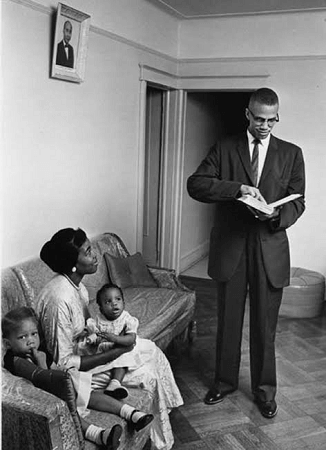
Betty Sanders met Malcolm X after one of his lectures in 1955, then again at a dinner party; she soon became a regular attendee at his lectures. She joined the Nation of Islam in 1956, changing her name to Betty X. Because one-on-one dates were against the Nation's teachings, the couple courted at social gatherings attended by dozens or hundreds of others, and Malcolm X made a point of inviting her to the frequent group visits he led to New York City's museums and libraries. Malcolm X proposed to her over the phone from Detroit in January 1958, and they married two days later. They had six daughters: Attallah (born 1958; Arabic for "gift of God"; possibly named after Attila the Hun); Qubilah (born 1960, named after Kublai Khan); Ilyasah (born 1962, named after Elijah Muhammad); Gamilah Lumumba (born 1964, named after Gamal Abdel Nasser and Patrice Lumumba); and twins Malikah (1965-2021) The Hinton Johnson CaseAfter Hinton Johnson, a Nation of Islam member, was beaten by two New York City police officers in 1957, the American public first heard of Malcolm X. On April 26, Johnson and two other bystanders, both members of the Nation of Islam, witnessed officers using nightsticks on an African-American man. When they tried to intervene, shouting, "You're not in Alabama... this is New York!" one of the officers turned on him, severely beating him, causing brain contusions and subdural hemorrhaging. Four African-American men were apprehended. Malcolm X and a small group of Muslims went to the police station after being alerted by a witness and demanding to see Johnson. Police initially denied that any Muslims were being detained, but after a crowd of about 500 people gathered, they allowed Malcolm X to speak with Johnson. Malcolm X then insisted on arranging for an ambulance to transport Johnson to Harlem Hospital. Johnson's injuries were treated, and thousands of people had gathered outside the police station by the time he was returned. Malcolm X and an attorney were inside the station making bail arrangements for two of the Muslims. Johnson was not released on bail, and police said he couldn't return to the hospital until his arraignment the next day. Malcolm X stepped outside the station house and signaled to the crowd that the situation had reached a stalemate. Nation members quietly exited, followed by the rest of the crowd. "No one man should have that much power," one police officer told the New York Amsterdam News. Within a month, the New York City Police Department had arranged for Malcolm X to be monitored; it also inquired with authorities in other cities where he had lived and prisons where he had served time. A grand jury did not indict the officers who beat Johnson. Malcolm X sent an angry telegram to the police commissioner in October. Soon after, the police department dispatched undercover agents to infiltrate the Nation of Islam. Malcolm X had adopted a new name by the late 1950s, Malcolm Shabazz or Malik el-Shabazz, though he was still widely known as Malcolm X. His comments on issues and events were widely reported in print, radio, and television, and he was featured in The Hate That Hate Produced, a 1959 New York City television broadcast about the Nation of Islam. Malcolm X was invited to the official functions of several African nations during the United Nations General Assembly in New York City in September 1960. He met Egyptian President Gamal Abdel Nasser, Guinean President Ahmed Sékou Touré, and Zambian African National Congress President Kenneth Kaunda. Advocacy and Teaching While Serving With The NationMalcolm X promoted the Nation of Islam's teachings from the time he joined it in 1952 until he left in 1964. These included the following beliefs:
In 1961, Malcolm X spoke at an NOI rally alongside George Lincoln Rockwell, the leader of the American Nazi Party; Rockwell claimed that Black nationalism and white supremacy overlapped. One of the civil rights movement's goals was to end African Americans' disenfranchisement, but the Nation of Islam prohibited its members from voting or participating in other aspects of the political process. The NAACP and other civil rights organizations condemned him and the Nation of Islam as irresponsible extremists whose views did not reflect the interests of African Americans as a whole. Malcolm X was a vocal opponent of the civil rights movement. He referred to Martin Luther King Jr. as a "chump" and other civil rights leaders as "stooges" of the white establishment. He dubbed the 1963 March on Washington "the farce on Washington" and questioned why so many Black people were enthusiastic about a protest "run by whites in front of a statue of a president who has been dead for a hundred years and who didn't like us when he was alive." While the civil rights movement fought against racial segregation, Malcolm X advocated for African Americans to be completely separated from whites. He proposed that African Americans return to Africa while establishing a separate country for Black people in America in the interim. He rejected the nonviolent strategy of the civil rights movement, arguing that Black people should defend and advance themselves "by any means necessary." His speeches had a substantial impact on his audiences, who were mostly African Americans living in northern and western cities. Many of them, tired of being told to wait for freedom, justice, equality, and respect, believed he articulated their grievances better than the civil rights movement. The Impact on Nation MembershipMalcolm X is widely regarded as the Nation of Islam's second most influential leader, after Elijah Muhammad. Between the early 1950s and the early 1960s, he was largely credited with the group's dramatic increase in membership. He persuaded boxer Cassius Clay to join the Nation, and the two became close friends. Clay brought Malcolm X and his family to Miami in January 1964 to watch him train for his fight against Sonny Liston. When Malcolm X left the Nation of Islam, he attempted to persuade Clay (who had been renamed Muhammad Ali by Elijah Muhammad) to join him in converting to Sunni Islam, but Clay refused, later describing the break as one of his greatest regrets. Malcolm X Receives More Media Attention Than Muhammad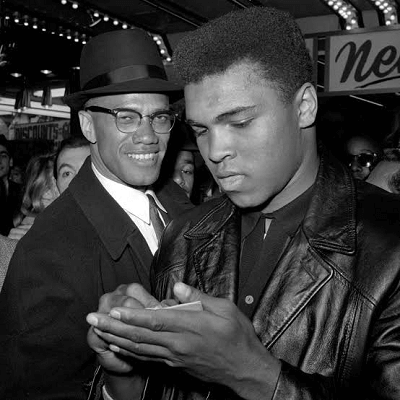
Malcolm X had become a media darling by this point, and some Nation members saw him as a threat to Muhammad's leadership. Publishers expressed interest in Malcolm X's autobiography, and when Louis Lomax wrote When the Word Is Given, a photograph of Malcolm X graced the cover. He also used five of his speeches but only one of Muhammad's - all of which enraged Muhammad and made him envious. Separation from the Nation of IslamMalcolm X publicly announced his separation from the Nation of Islam on March 8, 1964. Though he was still a Muslim, he believed that the Nation had "gone as far as it could" due to its strict teachings. He stated that he intended to form a Black nationalist organization to "raise the political consciousness" of African Americans. He also expressed a desire to collaborate with other civil rights leaders, claiming that Elijah Muhammad had previously prevented him from doing so. Following his Departure from the Nation of IslamMalcolm X founded Muslim Mosque, Inc. (MMI), a religious organization, and the Organization of Afro-American Unity (OAAU), a secular group that advocated Pan-Africanism, after leaving the Nation of Islam. On March 26, 1964, he met Martin Luther King Jr. for the first and only time - and only long enough for photographs - in Washington, D.C., while both men were attending the Senate debate on the Civil Rights bill at the US Capitol building. Malcolm X delivered a speech titled "The Ballot or the Bullet" in April, in which he advised African Americans to exercise their right to vote wisely but warned that if the government continued to deny African Americans full equality, they might have to take up arms. Several Sunni Muslims encouraged Malcolm X to learn about their faith in the weeks following his departure from the Nation of Islam. He soon converted to Sunni Islam. Mecca Pilgrimage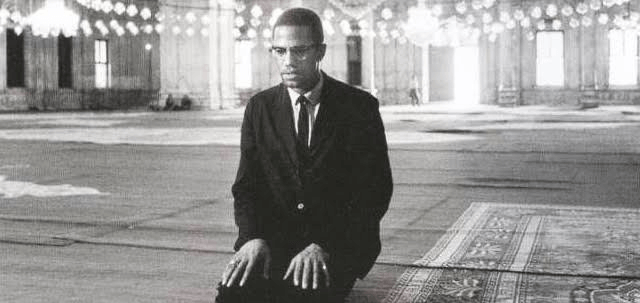
Malcolm X flew to Jeddah, Saudi Arabia, in April 1964 to begin his Hajj; the pilgrimage to Mecca required every Muslim who was able to do so, with financial assistance from his half-sister Ella Little-Collins. His status as a Muslim was called into question in Jeddah due to his US citizenship and inability to speak Arabic. With his visa approval, he received Abdul Rahman Hassan Azzam's book The Eternal Message of Muhammad, and he contacted the author. Azzam's son arranged his release and provided him with his personal hotel suite. The following morning, Malcolm X learned that Prince Faisal had invited him to be a state guest. Malcolm X met with the prince several days later after completing the Hajj rituals. Malcolm X later stated that seeing Muslims of "all colors, from blue-eyed blonds to black-skinned Africans" interact as equals inspired him to see Islam as a means of overcoming racial problems. Assassination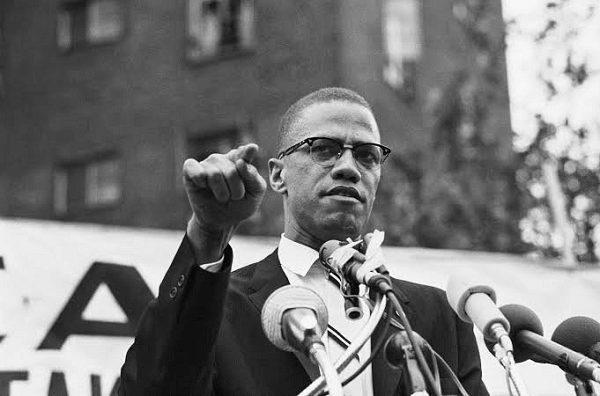
Malcolm X told interviewer Gordon Parks on February 19, 1965, that the Nation of Islam was actively attempting to kill him. On February 21, 1965, he was preparing to speak to the OAAU in Manhattan's Audubon Ballroom when a member of the 400-person audience yelled, "Hey, you're a jerk!" "Nigger! Take your hand out of my pocket!" As Malcolm X and his bodyguards attempted to calm the crowd, a man rushed forward and shot him once in the chest with a sawed-off shotgun, while two other men charged the stage with semi-automatic handguns. Malcolm X was pronounced dead shortly after arriving at Columbia Presbyterian Hospital at 3:30 p.m. The autopsy revealed 21 gunshot wounds to the chest, left shoulder, arms, and legs, as well as ten buckshot wounds from the first shotgun blast. The assassins, according to Les Payne and Tamara Payne's Pulitzer Prize-winning biography The Dead Are Arising: The Life of Malcolm X, were members of the Nation of Islam's Newark, New Jersey, mosque: William 25X (also known as William Bradley), who fired the shotgun; Leon Davis; and Thomas Hayer. Before police arrived, one of the gunmen, Nation of Islam member Talmadge Hayer (also known as Thomas Hagan), was beaten by the crowd. The other gunmen were identified as Nation members Norman 3X Butler and Thomas 15X Johnson by witnesses. In March 1966, all three were found guilty of murder and sentenced to life in prison. Hayer confessed at trial but refused to identify the other assailants other than to say they were not Butler and Johnson. In 1977 and 1978, he signed affidavits reaffirming Butler's and Johnson's innocence and naming four other Nation members of Newark's Mosque No. 25 as participants in or planning the murder. The case was not reopened as a result of these affidavits. Butler, now known as Muhammad Abdul Aziz, was released on parole in 1985 and took over as the leader of the Nation's Harlem Mosque in 1998; he maintains his innocence. Johnson, who changed his name to Khalil Islam while in prison, rejected the Nation's teachings and converted to Sunni Islam. He was released in 1987 and continued to maintain his innocence until his death in August 2009. Hayer, who also refused to accept the Nation's teachings while imprisoned and converted to Sunni Islam, is now known as Mujahid Halim. He was released on parole in 2010. Following a review that found the FBI and the New York Police Department withheld key evidence during the trial, Muhammad Abdul Aziz and Khalil Islam (formerly Norman 3X Butler and Thomas 15X Johnson) were exonerated in 2021. On July 14, 2022, Aziz filed a lawsuit in the United States District Court for the District of Columbia against the City of New York, seeking $40 million in damages for his wrongful imprisonment. Independent OpinionsMalcolm X announced his willingness to work with civil rights leaders after leaving the Nation of Islam, though he advocated for some policy changes. He believed that calling the movement a civil rights struggle would keep the issue within the borders of the United States, whereas changing the focus to human rights would make it an international concern. The movement could then take its complaints to the United Nations, where Malcolm X predicted that the world's emerging nations would join in. Malcolm X argued that if the United States government was unwilling or unable to protect Black people, they should do so themselves. He stated that he and the other OAAU members were determined to defend themselves from aggressors and to secure freedom, justice, and equality "by any means necessary." Malcolm X emphasized the global perspective he gained from his travels. He emphasized the "direct connection" between African Americans' domestic struggle for equal rights and Third World nations' independence struggles. He claimed that African Americans were mistaken in thinking of themselves as a minority; Black people were the majority worldwide. Malcolm X criticized capitalism in his speeches at the Militant Labor Forum, which the Socialist Workers Party sponsored. When asked after one of his speeches what political and economic system he preferred, he replied that he didn't know but that it was no coincidence that newly independent countries in the Third World were gravitating toward socialism. When a reporter asked him about socialism, Malcolm X asked if it was suitable for Black people. When the reporter informed him that it appeared to be the case, Malcolm X responded, "Then I'm for it." Although he no longer advocated segregating Blacks and Whites, Malcolm X maintained his support for Black nationalism, which he defined as self-determination for the African-American community. However, in the final months of his life, Malcolm X began to reconsider his support for Black nationalism after meeting northern African revolutionaries who appeared to be white.
Next TopicEdgar Allan Poe
|
 For Videos Join Our Youtube Channel: Join Now
For Videos Join Our Youtube Channel: Join Now
Feedback
- Send your Feedback to [email protected]
Help Others, Please Share









